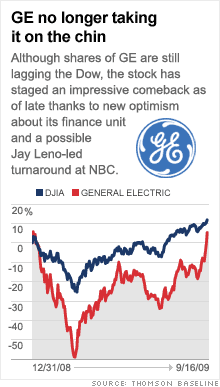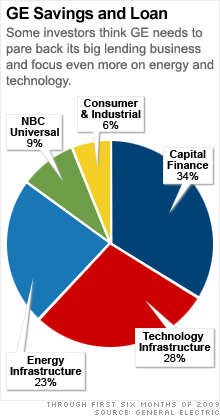GE finally paints it black
Wall Street loves GE again. The stock's up this year and the worst may be over for GE Capital and NBC. But is GE (and the broader market) now overpriced?



NEW YORK (CNNMoney.com) -- Wow. I just had the strangest dream that I had time warped back to 1992. Shares of General Electric were surging and NBC was enjoying great ratings.
But it's not a dream. GE (GE, Fortune 500) has been on a monstrous tear as of late.
With its more than 6% jump Wednesday, the stock has finally entered positive territory for 2009, joining 20 of its fellow Dow Jones industrial average members that are also in the black. It's even more impressive when you consider that at mid-year, GE was the worst-performing stock in the Dow.
And GE-owned NBC has had a nice ratings boost this week thanks to the debut of former "Tonight Show" host Jay Leno's prime-time program.
Whether Leno continues to attract viewers to NBC once curiosity fades about his new show -- and the other major networks start to roll out their fall premieres in earnest over the next few weeks -- remains to be seen.
But for NBC, the once-proud Peacock Network that was home to "The Cosby Show", "Cheers" and "Seinfeld" but has been mired in fourth place with the advertiser-coveted 18-49 age demographic since the 2004-2005 season, even a temporary ratings boost has to be considered good news.
GE's NBC Universal unit, which also owns a movie studio and several cable networks, has long been viewed by GE shareholders as an irritation, a division that seemed to have little to do with the company's core industrial, energy and technology businesses. Worse, it has typically been a drag on profits.
So any improvement in NBC's fortunes is likely to be greeted kindly by frustrated investors. It may even lead to a respite from the seemingly endless speculation that GE might be looking to sell its 80% stake in NBC.
(French media company Vivendi owns the remaining 20% in NBC Universal and Vivendi's CEO hinted at an investor conference earlier this week that it could sell its stake through an initial public offering.)
But the turnaround in GE's stock lately has a lot less to do with Jay Leno than it does with renewed optimism about the nation's financial sector.
GE isn't technically a bank. But it might as well be. The company's massive GE Capital financing arm still accounted for a third of GE's total sales in the first six months of this year despite having reported the steepest decline in sales of any of GE's businesses.
Some analysts and GE investors have been pushing GE to scale back its GE Capital arm even further and focus it more on vendor financing for corporate customers as opposed to consumer finance and real estate loans.
In other words, analysts want to see more deals like the one that American Airlines parent AMR (AMR, Fortune 500) announced Thursday. AMR received $1.6 billion in sales-leaseback financing from GE Capital Aviation Services for planes the airline has already ordered from Boeing (BA, Fortune 500). AMR also said it received an additional $280 million in cash in a loan from GE that used aircraft as collateral.
Even though these types of loans might make sense for GE, there are still concerns about the impact on GE if it is forced to register its finance unit as a bank holding company. If that were to happen, it is likely that the company would need to raise more capital to meet regulatory requirements.
Yet, GE's stock has roared back in recent months as investors grow increasingly convinced that the worst is over for the financial sector. The big rebound in GE has mirrored the rise in beaten-down banks like Citigroup (C, Fortune 500) and Bank of America (BAC, Fortune 500).
That said, there's more to the changing perception of GE on Wall Street than just the improved sentiment for banks and a possible turnaround at NBC. All the talk of a global economic rebound is also legitimately good news for GE's non-banking and media divisions.
It's worth noting that GE's technology division has held up remarkably well this year: first-half sales are only down 6% from a year ago and profits have slipped by just 3%. And GE's energy business has largely shrugged off the recession: its sales are up 2% from the same period last year while profits have jumped 16%.
It stands to reason that if the economic recovery is for real, demand for the company's aviation, health care and energy equipment should pick up significantly over the next few months. As such, shares of some of GE's top industrial competitors, such as Honeywell (HON, Fortune 500) and Siemens (SI), have also soared lately.
"The company as a whole is healthy. Spending on global infrastructure is alive and well. GE is in a great position to benefit from that," said Ted Parrish, co-manager of the Henssler Equity fund, which owns shares of GE. "The reason the stock was depressed was because of GE Capital. But it looks like exposure to commercial real estate is contained."
Still, you have to wonder if GE, like the rest of the banking sector and the broader market for that matter, is now more than a bit ahead of itself. The stock is no longer a screaming bargain.
Thanks to the recent surge, shares of GE now trade at nearly 19 times 2010 earnings estimates.
By way of comparison, the S&P 500 is valued at 15 times profit forecasts for next year -- so much for that conglomerate discount GE had been previously trading at on concerns it was too unwieldy and difficult to understand.
Parrish isn't worried. He thinks the stock could hit $20 before year's end. That's nearly 20% higher than its current price.
But with all that in mind, GE will face a big test next month when it reports its third quarter results. GE will need to show continued strength in its industrial businesses. And it must demonstrate some progress on turning GE Capital around.
Parrish said that as long as GE Capital doesn't get worse, investors should be satisfied. Back in July, all GE would say about the financing unit was that it would remain profitable. GE Capital earned $1.7 billion in the first half of this year, a decrease of 69% from a year ago. Another big decrease like that, while better than a loss, probably won't make shareholders happy.
Talkback: Is GE's stock overvalued or is it still a good buy? Share your comments below. ![]()


